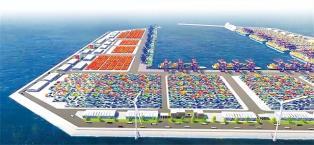Investors would only have to register their capital transfers with the State Bank of Việt Nam when investing abroad, according to the Ministry of Finance's proposal.

HÀ NỘI — The Ministry of Finance has proposed abolishing existing overseas investment registration certificates to facilitate capital outflows, recommending instead a streamlined foreign exchange management approach.
The proposal was raised in the draft revision of the Law on Investment.
Under the draft, the ministry proposed removing the requirement for investors to obtain approvals from the National Assembly, the Prime Minister and the Ministry of Finance before investing abroad. Instead, investors would only have to register their capital transfers with the State Bank of Việt Nam (SBV).
The ministry said that this will help improve the management of outbound investment by focusing on monitoring actual capital flow. Investors would register with the SBV only after securing relevant investment documents from the recipient countries, such as investment certificates, company establishment certificates and capital contribution contracts.
This reform also helps reduce administrative burdens, save time and costs for investors, enhance their competitiveness and facilitate quicker access to business opportunities in overseas markets, the ministry said.
The SBV will monitor investment flows to assess impacts on the balance of payments and foreign reserves. Banks would also have tools to enforce compliance, including suspending capital transfers or freezing investment accounts in case of violations.
Under current regulations, outbound projects with capital of VNĐ20 trillion (US$760 million) and special mechanisms require National Assembly approval; those above VNĐ800 billion and VNĐ400 billion in sensitive sectors such as banking, insurance, securities, media and telecommunications require the prime minister’s approval.
Complicated licensing procedures are limiting investors’ freedom and slowing down decision-making, the ministry said.

Bir Seba oil field in Algeria, developed by a joint venture of Việt Nam's Petrovietnam Exploration Production Corporation, Thailand's PTT Exploration and Production Public Company and Algeria's Sonatrach Group. In the first seven months of this year, Vietnamese investors disbursed $528.5 million abroad, 3.5 times higher than over the same period last year. — VNA/VNS Photo Ngọc Tú
Under current regulations, investors who want to transfer capital abroad must go through several steps to apply for licences in Việt Nam, with the management agency required to approve in detail the forms, scale, location and capital sources of the projects.
This approach is unreasonable because the projects must comply with the laws of the recipient country, which are not subject to Việt Nam’s law, the ministry said.
Another problem is that the current mechanism focuses on project approval, but it is difficult to bind the responsibility of investors after they have transferred money abroad. In fact, the main goal of investors is to conduct foreign exchange transactions to implement projects and business abroad. If the procedures are complicated, investors may miss opportunities, especially with deals that require quick decisions, the ministry added.
International experience shows that most countries only control the flow of money transferred abroad and apply restrictions in some cases to ensure macro-economic balance and legality of capital sources.
Currently, only Việt Nam, Laos and Indonesia maintain licensing for overseas investment.
China still grants licences but has loosened regulation, only managing large-scale projects or projects in specific fields.
Other countries have switched to a mechanism in which investors register capital transfers abroad with the banking system.
Switching from a licensing mechanism to a foreign exchange management approach will meet the State’s supervision requirements, improve business freedom and enhance the competitiveness of Vietnamese firms in the international market, the ministry stressed.
Removing licences and replacing them with a registration and post-check mechanism would be a bold institutional reform to facilitate private sector expansion abroad, according to lawyer Nguyễn Hông Chung, CEO of DVL Ventures.
This would cut administrative hurdles and give firms greater flexibility as well as align with Việt Nam’s policy of promoting private sector development and global integration, said President of the Việt Nam Association of Foreign-Invested Enterprises Nguyễn Anh Tuấn.
Phan Hữu Thắng, president of the Vietnam Industrial Park Finance Association, said the reform is essential to unleash the outbound investment, especially with the Politburo’s Resolution 68 opening new space for the private sector.
Experts also urged a comprehensive national strategy for outbound investment as well as incentives for repatriating profits.
The draft law also presents two other options for overseas investment licensing.
Under the second option, the procedure for approving overseas investment policies, which is currently under the authority of the National Assembly and the Prime Minister, will be abolished. The procedure for granting overseas investment certificates will be required only for projects with capital of VNĐ20 trillion or higher. Those below VNĐ20 trillion will only need to register foreign exchange transactions with the SBV to transfer money abroad.
The third option is to keep the regulations unchanged.
Previously, the Việt Nam Chamber of Commerce and Industry also proposed abolishing overseas investment registration certificates, adding that complicated procedures in Việt Nam undermine opportunities for firms in foreign markets while creating significant burdens for investors, because any change requires adjustments in certification.
The ministry cited statistics showing Việt Nam has 1,916 overseas projects worth a total of $23 billion as of the end of June. Of these, 67 per cent have capital below VNĐ20 trillion. Just 28 per cent have capital of VNĐ20 trillion or higher, but account for over 98 per cent of total overseas investment.
The rest are mainly projects with capital of less than VNĐ1.2 trillion.
In the first seven months of this year, Vietnamese investors disbursed $528.5 million abroad, 3.5 times higher than over the same period last year.
Major recipients included Laos ($150.3 million), the Philippines ($61.8 million), Indonesia ($60.5 million), Germany ($50.6 million) and the US ($31.2 million).
Việt Nam’s overseas investment totalled nearly $664.8 million in 2024, rising by 57.7 per cent over 2023. — VNS
- Tags
- overseas investment





